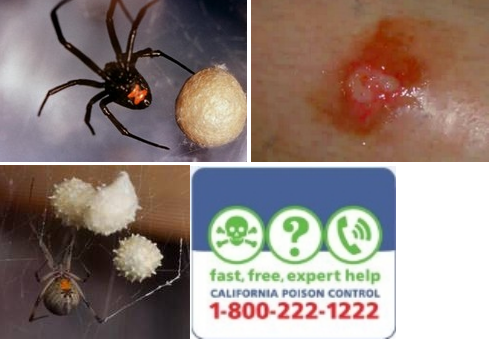 East County News Service
East County News Service
June 4, 2019 (San Diego) – The California Poison Control System suggests being on the lookout for spiders which are increasingly active when temperatures rise. Spider bites can result in small puncture wounds, pain, redness, itching and swelling that can last a couple of days. Most bites are usually not serious. California Poison Control System received 2800 calls related to insect and spider bites in 2018.
The only poisonous spiders in San Diego County are the Black Widow, Brown Widow and the Desert Recluse, according to the County Dept. of Environmental Health.
“Only a few spider species have fangs which can penetrate human skin and be worrisome to people. By following some precautions, people can minimize the chance of being bitten,” says Dr. Rais Vohra, Medical Director for the Fresno/Madera Division of CPCS. He added that, most spiders are killed only because they scare people, not because they are actually dangerous to humans. Spiders generally prefer to live in undisturbed areas where they can catch insects in peace.
Black widow spiders are very common in California, while the brown recluse spider is not a cause of human injury in the state. The black widow venom is dangerous even when baby spiders hatch. Black widows establish non-symmetrical webs in garages, closets, corners of patio furniture, as well as outdoors. They are usually not aggressive, so most bites occur because a spider is trapped or unintentionally touched. Dr. Vohra suggests the following spider bite prevention tips:
- Keep cribs and beds as far from the wall as possible.
- Shake all clothes thoroughly before wearing them.
- Check your bed thoroughly before climbing in; more so if the bed has not been slept in for a while
- Always put on gloves and long-sleeved shirts when going through or emptying closets, boxes or containers that have sat undisturbed for a while.
- Turn your shoes over and shake them out before putting them on.
- Teach children to respect spiders and to find an adult if they see one.
The symptoms of a black widow spider bite include minimal redness at the bite site, and gradually increasing pain over several hours after envenomation (venom is injected). Dr. Vohra added that the biggest problem with black widow spiders is that the bites are exceedingly painful. Patients usually describe an unrelenting, throbbing, dull pain near the site of the bite. In severe cases, the pain can become generalized and affect the whole back, torso or abdomen. A bite on the hand or arm can cause chest pain, and bites to the lower extremities can cause abdominal pain. A small area of redness or a localized sweat patch at the site of the bite is a tell-tale sign that doctors look for. If pain is increasingly severe, seek medical attention, as effective medicines are available.
Not all black widow bites need medical attention. Reasons to go to the doctor after a spider bite include discomfort which is increasingly severe; spreading local redness accompanied by pain and any drainage from a bite site.
The Brown Widow was first established in San Diego and Los Angeles County in early 2000. Since then it has become a common member of the local urban spider population in San Diego County and continues to expand it's numbers across Southern California. They are mottled tan and brown in appearance. Like the black widow, they also have a hourglass figure on the underside of their abdomen, however it is orange in appearance rather than red.
The Desert Recluse is not the same as the Brown Recluse. It is found in the Sonoran and Mojave deserts, the foothills of lower Joaquin Valley and areas close to the Mexican border. They prefer to live in remote unpopulated areas. They are nocturnal spiders, meaning they only come out at night and they live under rocks and in old animal burrows.
It should be noted that tarantulas, whether native or exotic, can also cause injury either with a bite or the irritation from their many hairs when they enter the skin or eyes.
People who believe that they have been bitten by a spider is far more common than actual spider bites, and many “bites” are actually bacterial skin infections. An expanding red painful area on the skin may be a staph infection and should be examined by a physician.
About CPCS
Call Poison Control at 1-800-222-1222 (number is the same in all states)for questions about poison encounters. Trained pharmacists, nurses and other providers are available to help 24 hours a day, seven days a week. The service is free, confidential and interpreters are available. Get weekly tips about safety by texting TIPS to 20121 for English or texting PUNTOS to 20121 for Spanish. Follow CPCS on Facebook and on Twitter @poisoninfo. CPCS is part of the University of California San Francisco School of Pharmacy and is responsible to the California Emergency Medical Services Authority.







Comments
:-{